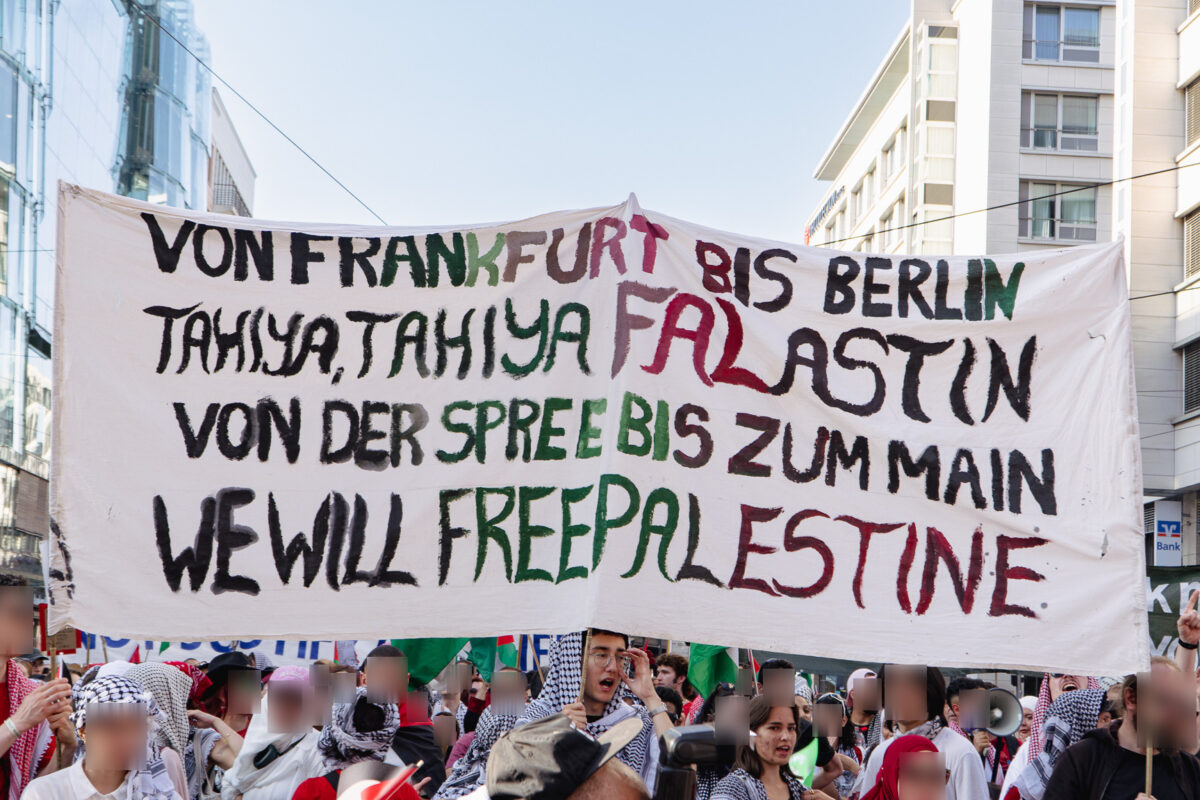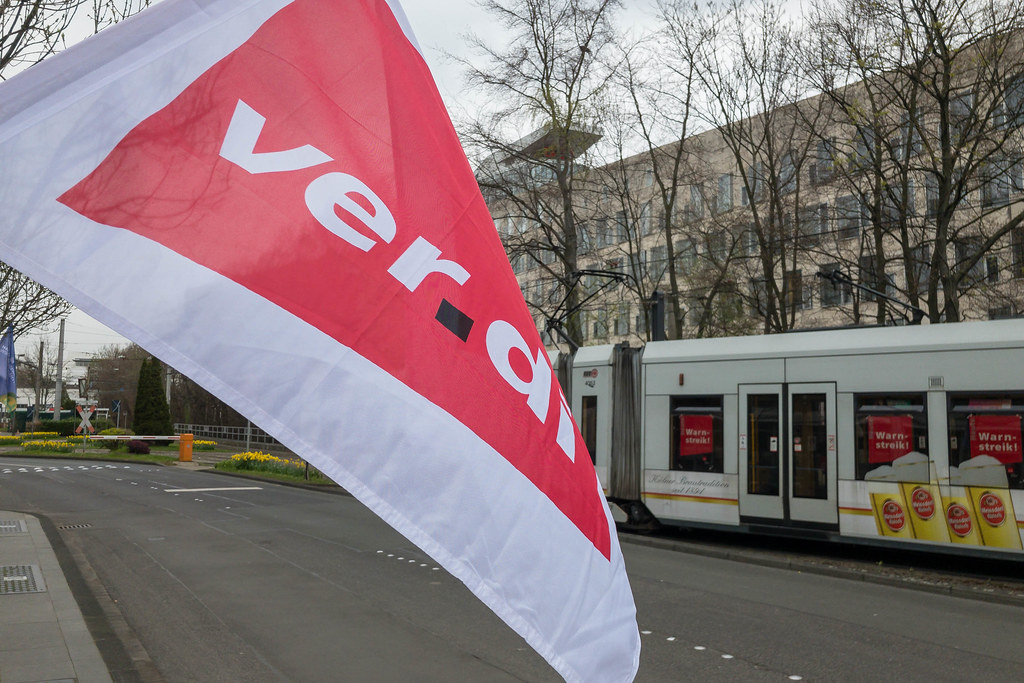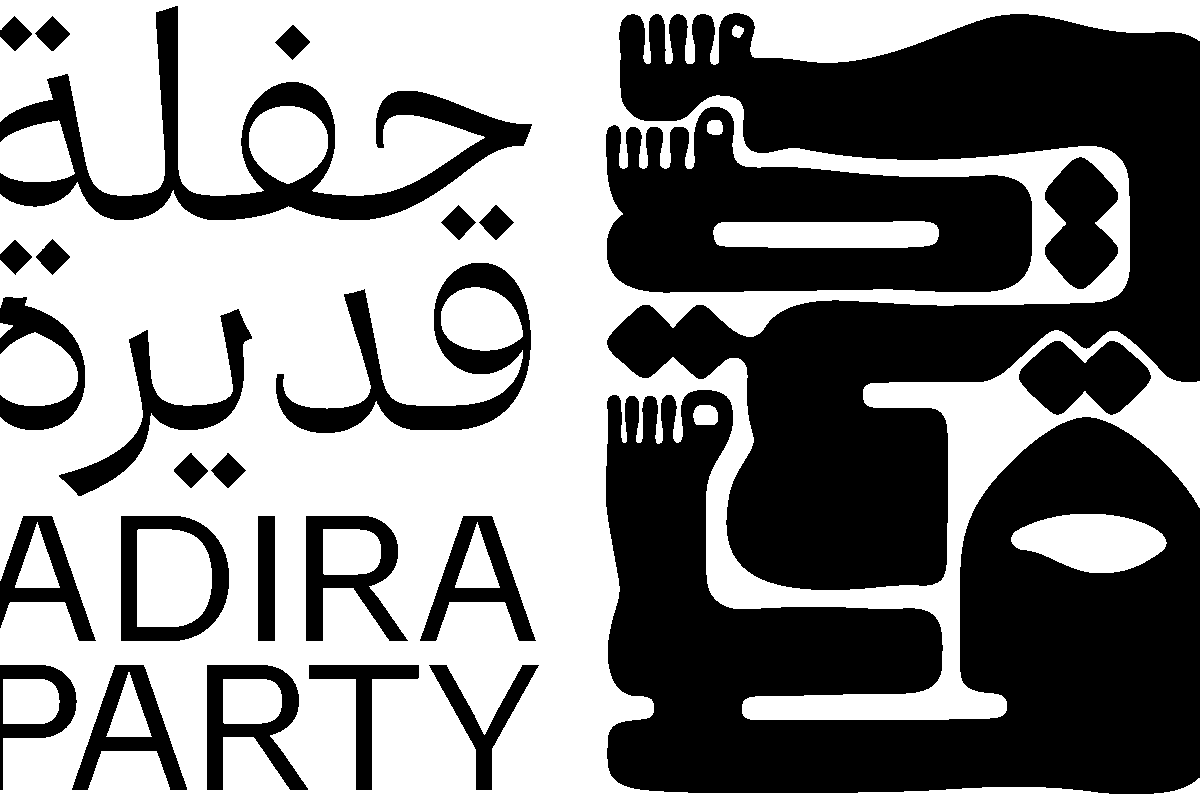Hello everyone. Thanks for talking to us. Could you start by briefly introducing yourself? Who are you and what is your connection to Thursday’s DSA Night School?
Phoebe: I’m Phoebe, an infrastructure engineer at a tech company in Berlin. I’m connected to this DSA Night School through the Tech Workers Coalition Berlin (TWC). TWC is a grassroots organization that empowers tech workers to build collective power and get involved in campaigns that make a positive impact on our society.
At my company I am part of a small group of employees forming a Works Council (Betriebsrat). Works Councils are democratically elected bodies of employees who participate in company decision making. They are internal complements to trade unions. Much of German labor law is pretty vague, because it assumes works councils exist to fill in the gaps.
Antje: I am Antje, I am a member of „Werkstatt für Bewegungsbildung“, a small Movement School here in Berlin that aims to support activists and organizations in building resilient, rewarding, and politically effective vehicles of social transformation.
I was invited to the Night School to talk about our ideas of organizing because we’ve worked with the Tech Workers Coalition, Lieferando riders, and Gorillas riders in the past and probably because our school also has a podcast on organizing called Spadework.
Rob: I’m Rob, I’m helping put together this event with Berlin DSA.
Is there a particular reason for holding the Night School now?
Rob: There’s been a recent uptick in organizing and militant labor activity both in Berlin and worldwide.
The highest profile cases in Berlin have probably been the wildcat strikes at Gorillas and the Hospital movement, both of which are tied to working conditions under Covid-19. Both movements activated a wider group of supporters looking to further build worker power in Berlin.
There’s been a flurry of activity in tech companies in particular, with works councils being formed amongst office workers, like at N26, and bike couriers, like at Lieferando.
Lastly, the Deutsche Wohnen und co. Enteignen campaign helped train so many new organizers, and has been identifying the other powerful forces which are making Berlin less and less habitable – like big tech.
For us, all of this points to the emergence of a broad, dynamic organizing network. This network already exists among a patchwork of political groups, social networks, and friendships. We’re excited to facilitate these connections however we can.
Phoebe: It’s an interesting time because we see more and more Berlin tech companies forming works councils, similar to how we see more US tech companies unionizing (or trying to) each year.
I’m particularly inspired by the recent activism of employees at HelloFresh. Berlin office workers, (engineering, design, operations, etc) engaged many of their colleagues to show solidarity with HelloFresh warehouse workers in the US prior to votes to unionize two warehouses there. Even more Berlin employees were moved to speak up when they learned about how their employer was surveilling them in slack during this activism.
Unfortunately both union votes failed, but I like this example of office workers standing up for the rights of warehouse workers overseas. Since the union votes, that same group of Berlin employees also published an open salary initiative.
Let’s moved onto the campaigns and workplaces that you are involved in. What are the difficulties of organising precarious workers? How have you overcome them?
Phoebe: I’ve been organizing my colleagues for about a year leading up to the current process of forming the works council. We are all white collar workers, many of us have been remote for that whole time (I have). Organizing in tech, arguably the most privileged workers, has its own unique challenges. The first is convincing my colleagues to see themselves as workers at all. There’s a common feeling among the most in-demand roles that “if I don’t like it here, I can just get a different job.”
But this is not true for all tech workers, even in the office. There is a spectrum of precariousness, from people relying on the work for their visa, to parents, or folks in operations and support roles that just have it worse than those in engineering. I don’t have a good answer for overcoming these challenges. And even for those that can just “get a different job”, the largest problems are likely the same at the next company, because they stem from the balance of power in the workplace between workers and management, not from particular executives or policies.
I’ve found making connections with more precarious colleagues, even if they do not join our organizing effort, pays off down the line. The goal is to build trust so they know your organizing effort intends to address their issues, and they become part of a network of information and assistance. I’m hoping I can recruit some of these folks to the council itself, after several conversations during this process.
Antje: Our position as organizing trainers and facilitators, as well as people with direct experience of precarious labor, has provided us with some insight into the problems that face precarious workers.
It is a field of labour organizing with very specific needs. In fact, we quite often see that organizing models are not addressing workplaces without long term contracts or with few to no shared rooms.
We talked with Jane McAlevey on one of our episodes about this issue, and she agreed that the organizing model she promotes assumes stable relationships between workers, as stable relations over time are what allows influence to even emerge. In other words, the more workers are socially organized together, the better political organization can emerge.
But what happens when labor processes – like Lieferando – have been designed so that such social organization between workers is largely impossible? Or when workers bounce from work place to work place, as many cognitive laborers do? Or when workers, like many delivery riders, simply do not identify with their labor, when they do not think of themselves as riders, but as students who are only temporarily laboring as riders?
Then, the starting point is different. At the moment we are trying to get workers to understand workers’ organization as a vehicle of care that allows workers to better care for themselves, their loved ones, and their community. This means developing relationships of care with your co-workers. Building trust. Building community. Building the sociality from which a political process can develop.
How much are non-Germans involved? Do they have any specific problems?
Antje: In terms of specific problems, there is the unfamiliarity with German law and the German political scene. They don’t necessarily know what the infrastructures are through which they can organize, what the legal goals are that they could be fighting for (like a works council).
At the legal level, well, if you don’t speak German, winning legal recognition of a works council will mean having to interface with a legal system that operates almost exclusively in German – a German that is even for native speakers not always easy to understand.
At the organizational level, you’re dealing with a base defined by difference. People are coming from different parts of the world, and according to the specific historical-political processes they come out of they are going to have differing opinions about all sorts of things. Unions mean different things in the United States, Mexico, Brazil, and Russia. The word comrade means something very different to Latin Americans than it does to people from the former Soviet Union. Political organizational cultures are very different..
Phoebe: Our company is very international and our organizing group is mostly non-Germans. In some cases, that means they rely on the job for their visa, so speaking up or doing any sort of activism (like serving on a works council), feels very risky. In other cases, international folks are hard to organize because the conditions in Germany are already much better than their home country. They don’t see a need to speak up.
Is there a link between the struggles of Tech workers, and those of, say, delivery riders?
Phoebe: The link is that we are all resources being exploited by management to make a profit for the company. It’s easier to see how delivery riders are exploited, especially when they are specifically not employees of the app company.
While the conditions of the work are very different, this is still true for engineers and designers. Organizing in this space is so important specifically to trigger this realization that the office workers in tech are workers too. We need to bust the myth that tech companies are families that have the interests of “their people” above profit. Once we are organized, we can more easily stand in solidarity with the most precarious workers.
Rob: The key link is that both are tech workers, since they’re employed by tech companies. It’s not a coincidence that big tech creates new groups of precarious workers. Start-up reveries of innovation and disruption are nothing more than the gloss over the physical labor needed to make an app work. Just as the word tech brings to mind a programmer behind a computer, we should also think of a bike courier on the street, or a content moderator watching yet another gory video.
Building worker power means living in reality, and bringing together everyone whose wage is subject to the whims of big tech. The power of big tech is growing in Berlin, accelerating gentrification and the corporatization of our city, which affects us all, tech worker or not. Worker power inside tech companies would benefit us all.
What has been your experience of official trade unions?
Antje: Any organization is a structure of agency and relations that always has a balance of forces. There are advantages and disadvantages to all forms of organization. Official unions have the advantage that they already have large resources and large bases. The control over resources and the influence over bases is however contested. Some people in decision-making roles have terrible politics. Others have very good politics.
The experiences of many workers when they interface with structures like Verd.i or IG Metall might be terrible or wonderful – depending on whether they interface with the good or the bad currents within the unions. We do have the chance to influence this. The union is not an actor, but an organization consisting of multiple actors. As a union member you are one of them.
Phoebe: I have been working closely with a secretary from Ver.di while organizing a works council. They act as a subject matter expert, give advice, and help us with some logistics during the process. I’m also a member myself.
What would be your advice to someone who would like to fight for better conditions in their own workplace?
Antje: Learn from mistakes that others have made. The struggle for better working conditions is very long. Many of your problems have been encountered in the past, so develop and participate in spaces of formal and informal learning. Read up on organizing, meet with other organizers in other struggles, or find yourself a movement school can really help you in your struggle.
We sometimes forget that struggling for better working conditions, for our communities, for the ability to care for ourselves and loved ones, doesn’t come naturally. The experience of oppression, of exploitation, of an inability to care as we want – that alone doesn’t enable us to understand what causes the suffering. And it certainly doesn’t enable us to understand how to overcome damaging structures.
We also have to learn how to have an efficient meeting amongst co-workers – without any hierarchies that might set an automatic order. We need very specific knowledges – how to have one-on-ones, how to develop systematic outreach structures, how to resolve conflicts – and that only exists amongst those that are active in different struggles.
A last lesson that I really learned a little too late for some very exciting political projects: don’t forget to practice the care you want to reach amongst each other. Take time to bake or cook together. Listen to a little personal story, make room for your co-workers to be not just an activist but also a parent, a lover, a neighbor.
Phoebe: Find the right people to join you. The most political or vocal are not always the right people. Use structure tests to figure out who has time for you. Attend an organizing training. If you are a tech worker, join TWC to meet other folks doing the same thing.
The event is being organised by DSA Berlin. What is the role of political organisations like the DSA?
Rob: Any of us would be the first to admit how silly the phrase “Democratic Socalists of America – Berlin” sounds. But I think this can actually be a strength. We have no illusions of building a political party here or putting ongoing struggles under our leadership. What we can do is use our unique position as migrants, often with structural advantages, to organize our workplaces.
Many of us at DSA find ourselves and our social/political networks at the intersections of office and warehouse workers, new arrivals who are in their first German class and those well-versed in German law. We can use our position to find common ground in tech worker struggles and tap into our organizing power and resources.
Phoebe: I owe a lot of our organizing success to trainings that I did with UNI Global Union and the Rosa Luxemburg Stiftung. Political organizations like DSA could offer practical education about organizing, as well as connections with other people also doing organizing work. Also getting laws passed that protect workers and support their right to organize.
Antje: I actually think that the DSA can offer a kind of knowledge transfer that I mentioned before. As an organization that doesn’t have one particular cause – such as forming a workers council or expropriating big for profit landlords – it can provide a certain network to keep consistency between different specific struggles.
What are your expectations from the Night School? What happens next?
Phoebe: This is my first night school! I expect to learn from the other presenters about their work organizing in warehouses, and how my work in the office (remotely) can support them. Thanks for having me.
Antje: I am really looking forward to hearing from the different struggles here in Berlin. They all address fields of work that do not fit into the classic German labor struggles of the past decades. I hope that we can learn from each other, stay connected and win together in coming struggles.
Rob: We hope to build connections between organizers, plug people into these networks, and come up with further angles of attack against big tech. There’s much more work to be done!
Finally, if someone wants to attend the Night School, what should they do?
Rob: They should come to the Aequa Community Centre in Wedding on Thursday March 31st. The panel starts at 7:30pm.



